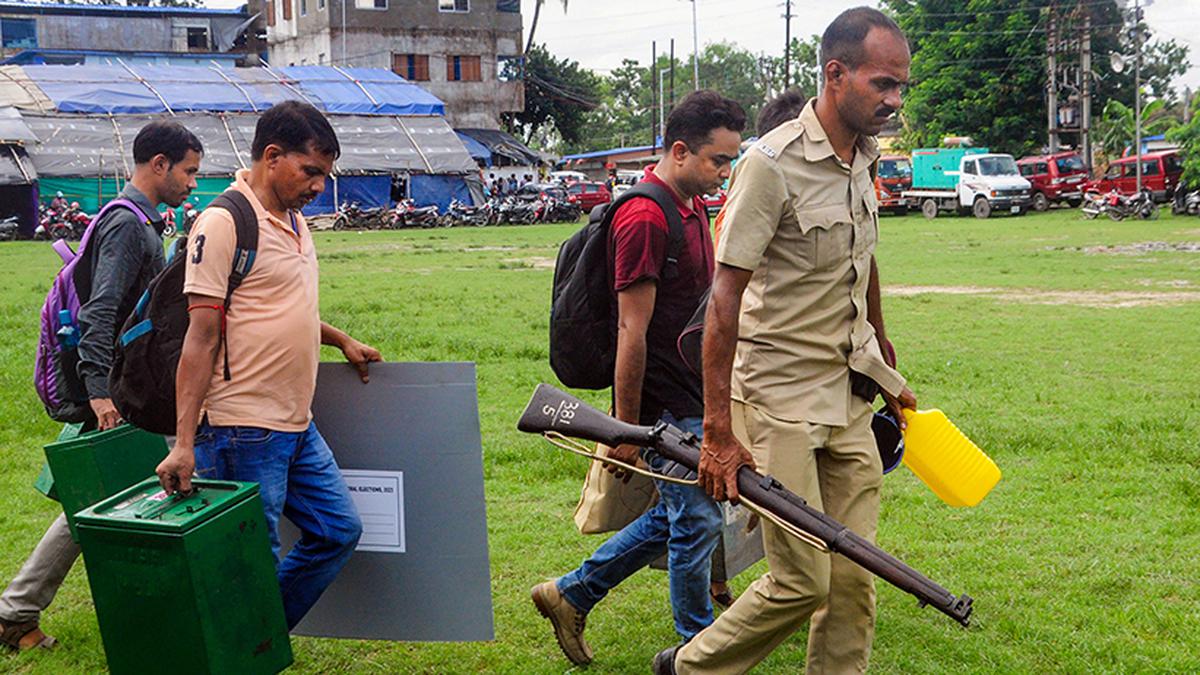
Centre pulls up West Bengal for allegedly transferring midday meal funds towards elections
The Hindu
The papers made available on WhatsApp by the State officials suggest that a dormant bank account has been used for transfer of funds for State elections.
In a strongly worded letter, the Union government has sought an explanation from the West Bengal government regarding the diversion of PM POSHAN (midday meal scheme) funds for State elections.
The letter dated July 7, a copy of which was accessed by The Hindu, states, “Bare perusal of the fund transfer suggests that funds earmarked for midday meal under PM POSHAN are being used for a different purpose. The papers made available on WhatsApp by the State officials suggest that a dormant bank account has been used for transfer of funds for State elections. It may be agreed that this is contrary to the principles of financial management as distinct bank accounts are to be used for distinct purposes.”
The Centre noted there was a total fund of ₹1,542.7 crore in the Single Nodal Account (SNA) of PM POSHAN as of March 31, 2023. It then notes, that the State treasury has transferred only ₹387.35 crore to SNA during 2023-24. It further says that as of July 4, 2023, the balance for the SNA shows ₹4,174.28 crore. “It is not clear how balance in the SNA account increased from ₹1,542.7 crore to ₹4,174 crore…,” the letter states.
SNAs are opened, under the direction of the Union government for the transfer of unspent funds in the bank accounts of implementing agencies.
The letter states that the West Bengal government, in a letter dated January 25, 2022, had submitted an undertaking certifying the transfer of all unspent funds to the SNA and the conversion into zero balance accounts or closure of the bank accounts of all implementing agencies. The letter says that the current situation of increased balances is a “highly incongruous” situation.
“It is a possibility that allotments under PMPY in the past i.e., pre-PFMS days, are being used for purposes other than the PM POSHAN (midday meal) scheme. It is also surprising that a dormant bank account scheme is being used for financial transactions,” the letter states.
A ‘detailed factual’ report is being sought from the West Bengal government regarding the ‘serious financial anomalies’. The letter also suggests that similar bank accounts and anomalies may exist in other districts and directions for the same are sought.

“Writing, in general, is a very solitary process,” says Yauvanika Chopra, Associate Director at The New India Foundation (NIF), which, earlier this year, announced the 12th edition of its NIF Book Fellowships for research and scholarship about Indian history after Independence. While authors, in general, are built for it, it can still get very lonely, says Chopra, pointing out that the fellowship’s community support is as valuable as the monetary benefits it offers. “There is a solid community of NIF fellows, trustees, language experts, jury members, all of whom are incredibly competent,” she says. “They really help make authors feel supported from manuscript to publication, so you never feel like you’re struggling through isolation.”

Several principals of government and private schools in Delhi on Tuesday said the Directorate of Education (DoE) circular from a day earlier, directing schools to conduct classes in ‘hybrid’ mode, had caused confusion regarding day-to-day operations as they did not know how many students would return to school from Wednesday and how would teachers instruct in two modes — online and in person — at once. The DoE circular on Monday had also stated that the option to “exercise online mode of education, wherever available, shall vest with the students and their guardians”. Several schoolteachers also expressed confusion regarding the DoE order. A government schoolteacher said he was unsure of how to cope with the resumption of physical classes, given that the order directing government offices to ensure that 50% of the employees work from home is still in place. On Monday, the Commission for Air Quality Management in the National Capital Region and Adjoining Areas (CAQM) had, on the orders of the Supreme Court, directed schools in Delhi-NCR to shift classes to the hybrid mode, following which the DoE had issued the circular. The court had urged the Centre’s pollution watchdog to consider restarting physical classes due to many students missing out on the mid-day meals and lacking the necessary means to attend classes online. The CAQM had, on November 20, asked schools in Delhi-NCR to shift to the online mode of teaching.









